Used car buying guide: Lotus Evora and Evora S
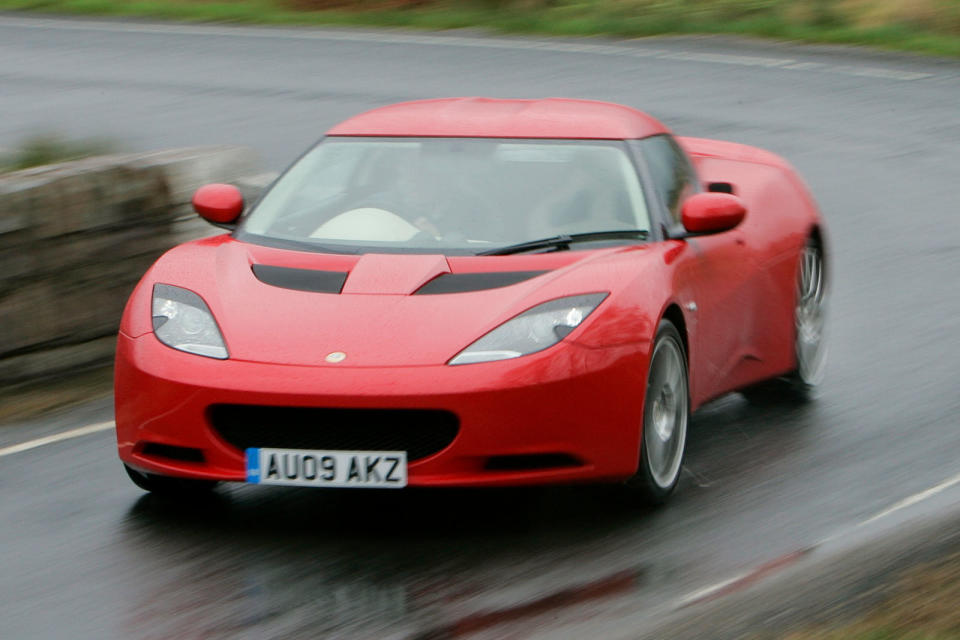
The standard Evora had a 0-62mph sprint time of less than 5.5sec
The problem with the admirable Lotus Elise is that while all that pure and animal-like intercommunication between car and driver makes for an unparalleled synthesis of automotive pleasure, especially on a racetrack, the car is not much cop if you want to travel further than the local pub or you need to take your children to school.
Enter, stage left, the Lotus Evora – a 2+2 Lotus with all the swagger and a three-section composite body (with easily replaceable plastic bumpers) but with a token nod towards comfort and touring.
If you're willing to pay around £25k for a used one, your faith will be rewarded with a 0-62mph sprint time of less than 5.5sec, track-tuned handling and steering, and a magic-carpet ride. You’ll also net a bulletproof Toyota V6 with low running costs and two more seats than its rival, the Porsche Cayman.
In the years since the first Evora went on sale, no serious reliability issues have raised their head. The engines are still doing a shift, as is the Eaton supercharger on S models. The loose gearbox cables that blighted some early cars have been tweaked, and the floppy door handles have been rectified.
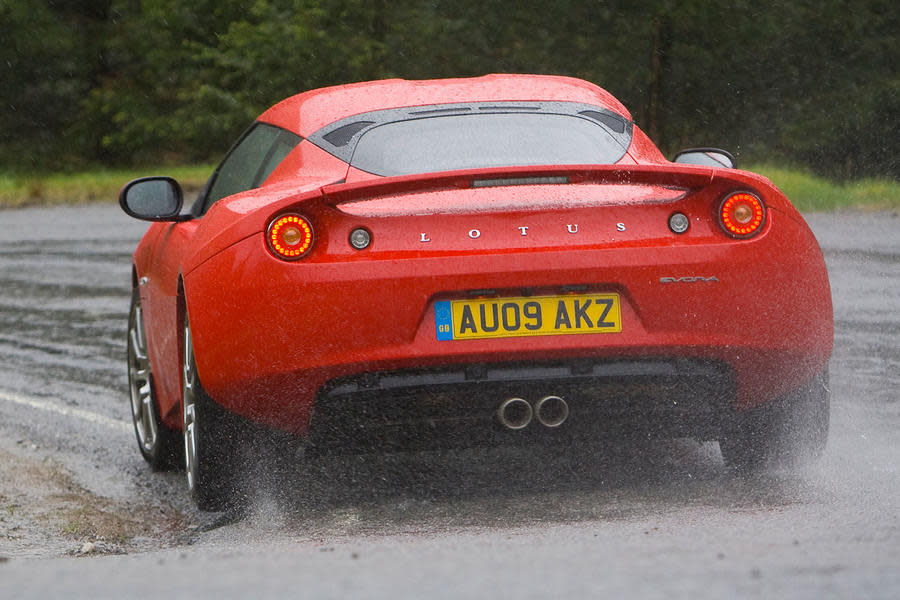
The interiors on well-used early examples may be looking a little tired and the front anti-roll bar bushes may be starting to knock, but that’s it.
The Evora was launched in 2009 with a mid-mounted Toyota 3.5-litre V6 producing 276bhp and 258lb ft and driving the rear wheels through a six-speed manual gearbox. Its three-section composite body (with easily replaceable plastic bumpers) houses a 2+2 cabin (although there are some Evoras with two seats and an extended parcel shelf) and a boot large enough for a set of golf clubs.
But you won’t want to waste time on the links when you’ve an Evora to play with. Double-wishbone suspension, Eibach springs and Bilstein dampers, brake parts by AP Racing and standard-fit Pirelli P Zeros (18in items at the front, 19s at the rear) make sure of that.
The first cars got the Launch Pack, comprising Tech (sat-nav, parking aids, cruise control), Sport (cross-drilled discs, a deeper spoiler and uprated exhaust) and Premium (extra leather, heated seats, reversing camera). All the goodies became available singly, too. Another option was a close-ratio Sport gearbox.
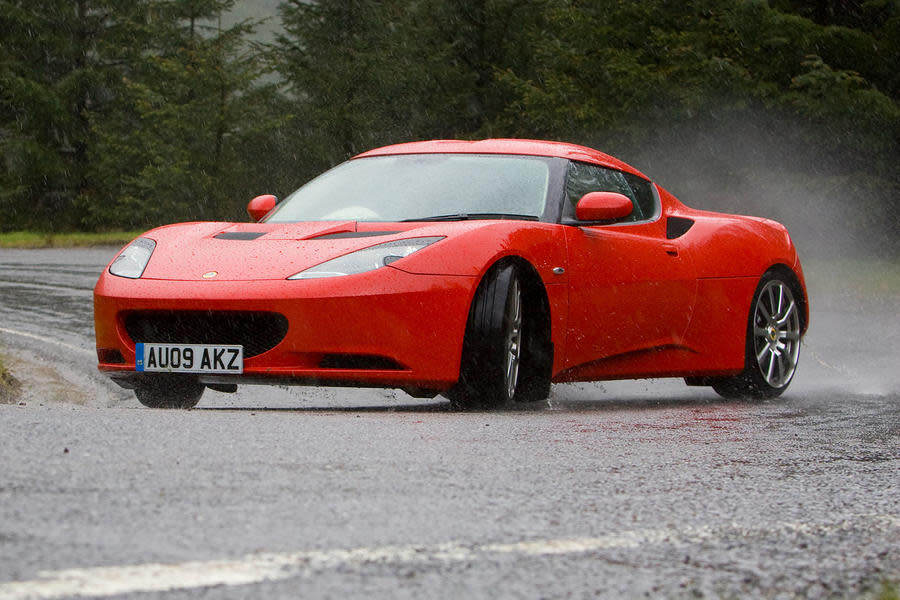
The Toyota-derived six-speed IPS (Intelligent Precision Shift) automatic transmission arrived the following year. Although it exacts slight penalties on performance and efficiency, it is more reliable than the trouble-prone manual, with its slack cables. Lotus fitted tighter ones and then the 2012-model-year refresh brought low-friction gear selection cables and a low-inertia flywheel.
The cabin gained the Premium Pack as standard, improved door locks, better sound deadening and a new infotainment system. Standard Evoras also gained the S’s thicker rear anti-roll bar, stiffer wishbone bushes and a more compelling exhaust note. It’s all enough to make you think twice about that Cayman.
An expert’s view
Jamie Matthews, Bell and Colvill: “The Evora is for someone looking for a performance car that’s a little bit different. Buyers are enthusiasts who are shrewd and knowledgeable. Some may be looking at a Cayman, too, but the Evora out-rides and out-handles it while being that bit more practical. The Lotus is much rarer, too.
“When looking at a used one, check the clutch for any slip and a heavy pedal, and listen for a louder-thanusual chattering sound at idle. A new clutch can cost you £3000 but they can last up to 40,000 miles. “My pick? A 2011-model-year S for around £35,000.”
By John Evans
Lotus Evora S used car buying guide
Faster versions of the Evora followed, including the S, the 400, the Sport 410, a GT410 Sport and a GT430, the last with a top speed just shy of the 200mph mark.
A Lotus is about more than just comfort and straight-line speed. It’s about handling finesse, and here the Evora excelled (no pun intended). It’s one of those rare and wonderful cars that is happy to corner in whichever way its driver wants it to.
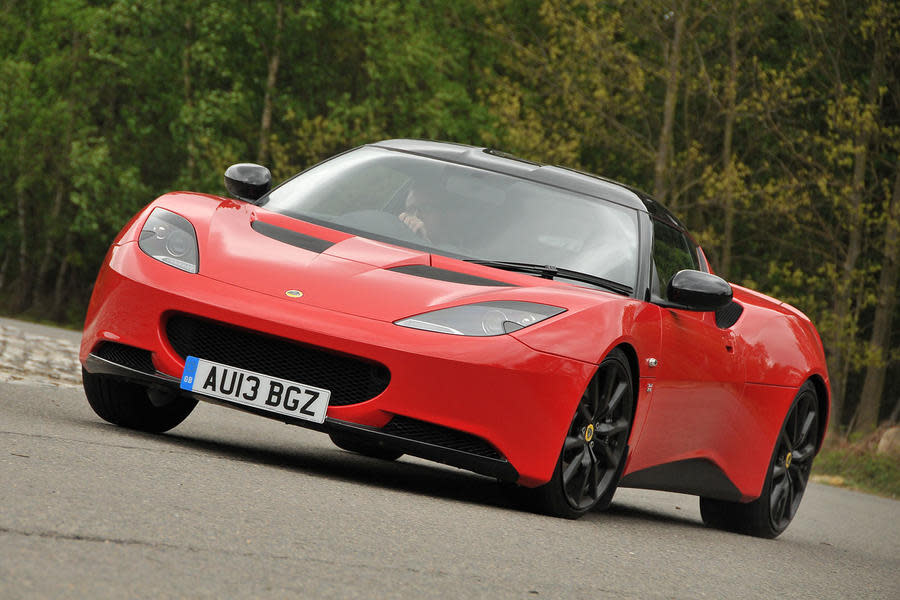
The steering has a lovely oily, linear feel and perfect weighting, not an ounce too heavy and not too light. Without excess provocation, the Evora will grip soundly until its front wheels start to slip.
It can be provoked into a predictable, wonderfully forgiving slide. (There’s an electronic lock for the open differential.) Switching out the traction control’s intervention completely is the point from where the Evora’s chassis really shows its mettle. In our eyes, no other production car of the time handled as well as an Evora once beyond its limits.
It rode well too, at least in its original form. In faster driving, the Evora maintains a supple ride across crests and bumps, with high levels of body control. Only the loose, vague gearshift of the early cars lets it down, which is the weakest part of an otherwise impressive (S-Class be damned) performance inventory.
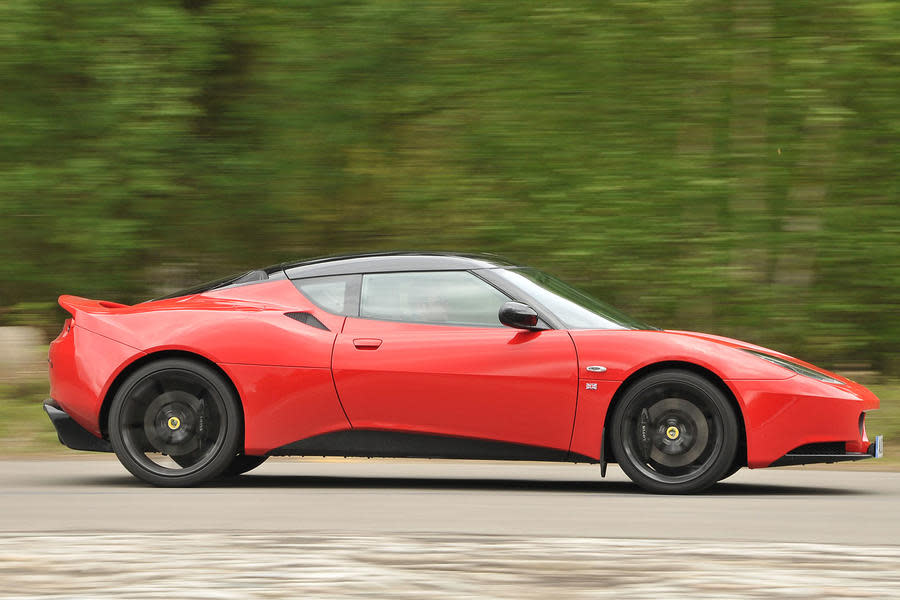
So, a potentially reliable Lotus. Spacious up front. Moderately refined. Handles brilliantly. Still goes like stink and retains value like lipstick clinging to a guilty man’s collar. Manna from Hethel.
What we said then
26 September 2009: “So, the Evora wins our Britain’s Best Driver’s Car contest by a country mile two weeks ago, and then scores only four stars in our road test. But there is logic to this. In its ride and handling, the Evora is exceptional, as are its brakes. The engine is more than up to the job too. In these respects alone, it’s a five-star car. However, Lotus is positioning the Evora as a GT, rivalling not only the Cayman but also the 911, and it is priced accordingly. The cold reality is that the Evora asks its buyer to accept compromises in exchange for its excellence in other areas.”
An owner's view
Jim Holder: “I had an Evora S and loved it. For me, every journey felt like a special occasion, and it even handled commuting with aplomb. Its ride and handling balance and its steering were all terrific, and its engine was silky smooth. I had the IPS (Intelligent Precision Shift) automatic gearbox in mine, which fared well, but I think most would prefer the manual.
"The optional Recaro seats in my car were a joy, wonderfully comfortable and supportive. Mind you, getting in the car could be a bit of a squeeze. Our only trip to a Lotus dealer was when a fuse blew when we tried to use the windscreen wipers while they were iced to the windscreen, which was entirely my fault.”
What to watch out for
Engine: The chain-driven Toyota V6 is reliable but check the ECU for any record of over-revving. There have been some reported problems with the Edelbrock supercharger, albeit mostly in US cars. Check the engine has been serviced every year or 9000 miles and the exhaust mounts are sound (a warranty issue on early cars). Expect around 23mpg from the original Evora and the S in everyday use.
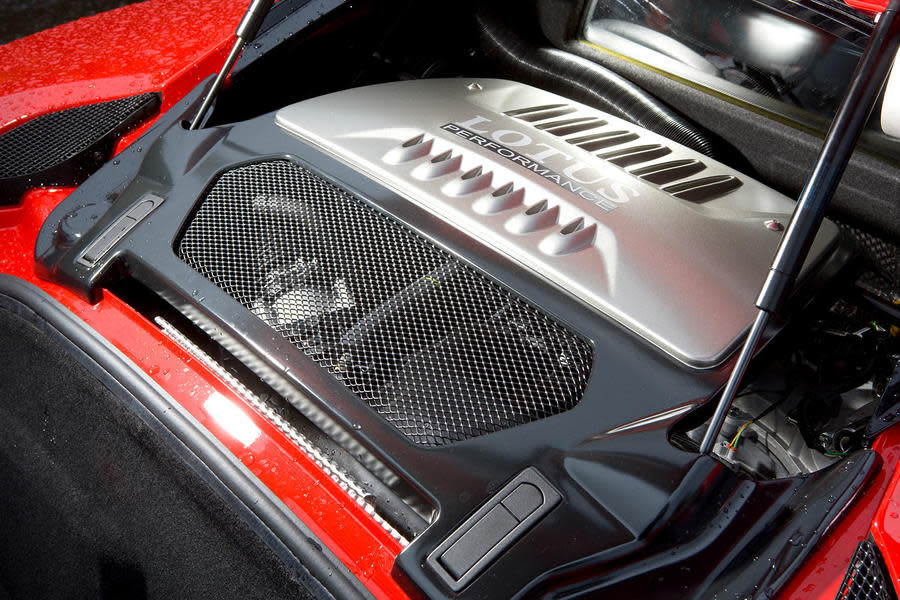
Gearbox: On early cars, manual gearchange cables can stretch, become noisy and make changes difficult. Adjustment or replacement requires interior trim removal. Later cars solved the issue with better cables. The clutch can fail as early as 25,000 miles. Check that the IPS gearbox changes smoothly.
Suspension and brakes: The Evora should steer, brake and ride like you would expect a Lotus to. Watch out for signs of track abuse. Uneven tyre wear could indicate misaligned tracking caused by a past crash. A knocking at the front is likely to be worn anti-roll bar bushes.
Body: Check the panel gaps because any out-of-shape parts of the composite bodywork will be expensive to set right. Rust won’t be a problem, though. Door handles can give up the ghost. Tailgate panels can get dented by over-enthusiastic use. Bootlids and petrol filler caps can give trouble.
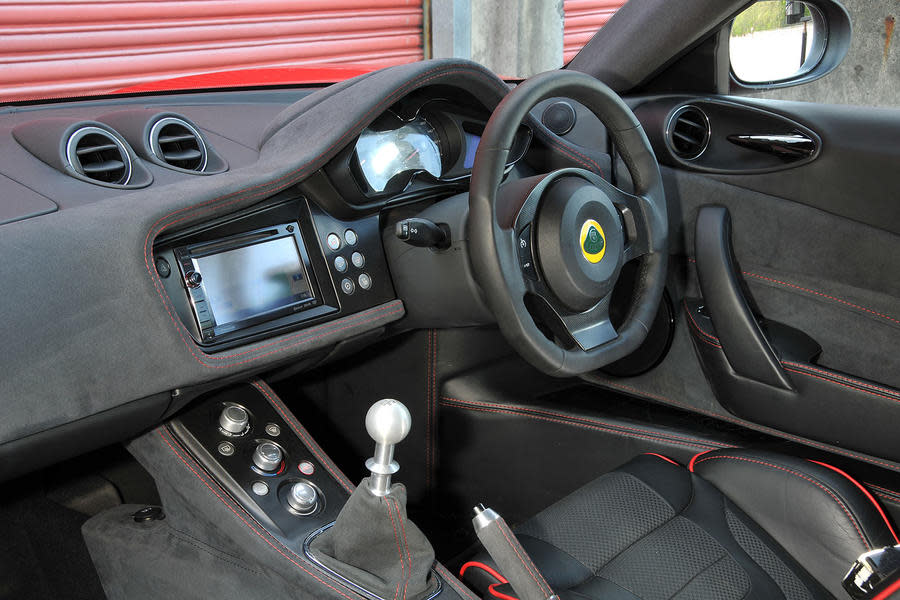
Interior: Early cars were criticised for poor interior quality but this improved in later examples. Sat-nav has been criticised for its level of efficiency and response. Check for worn driver’s seat side bolsters, door speakers, lower fascia and fragile leather facings on sills.
Also worth knowing
In addition to a manual gearbox, the Evora was also offered with a Toyota-derived six-speed IPS automatic. Although it exacts slight penalties on performance and efficiency, it is more reliable than the trouble-prone manual, with its slack cables.
Lotus fitted tighter cables eventually and the 2012-model-year refresh brought low-friction gear selection cables and a low-inertia flywheel.
In 2010, Lotus sprang the supercharged Evora S (345bhp, 295lb ft). The 2015 Evora 400 (400bhp, 302lb ft) replaced the Evora and the Evora S. Its extra reserves were made possible by an intercooled supercharger developed by Edelbrock. It was followed in 2016 by the Evora Sport 410 (410bhp, 310lb ft) and in 2017 by the Evora GT430 (430bhp, 325lb ft) and Sport versions of the GT410 and GT430.
How much to spend
£25,000-£29,999: Early and likeable 2009/2010 Evoras in good condition with a full history and mileages of 30,000 to 90,000.
£30,000-£44,999: Mix of 2011-onwards cars with low mileages and a full service history.
£45,000 and above: Post-2015 cars with average miles and in top condition. Spend £70k and more on the last 2020 and 2021 cars. The GT430 can fetch up to £100k.
One we found
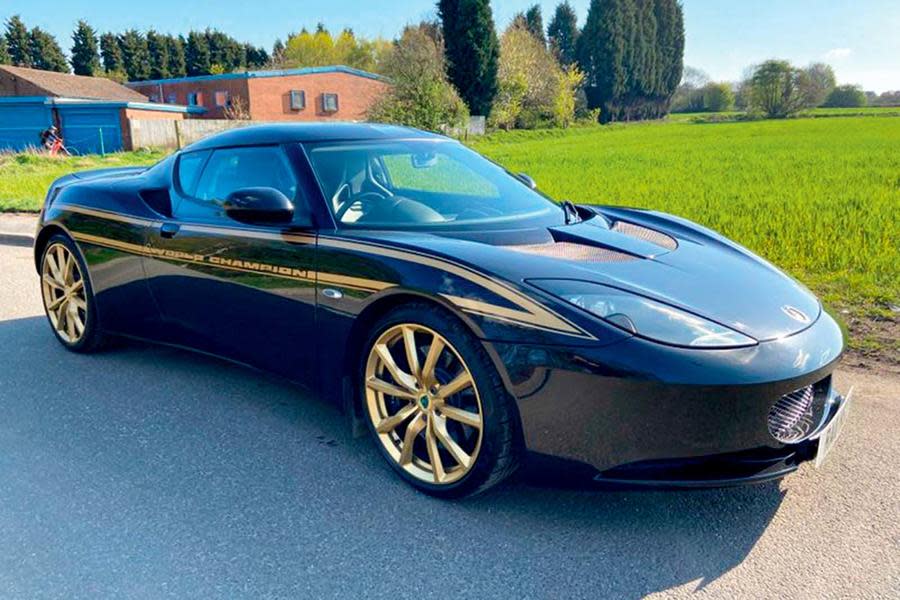
Lotus Evora 3.5 V6, 2011, 17,000 miles, £32,895: This high-spec, immaculate-looking JPS Edition has had two former owners. The seller says it has been fastidiously maintained and the service book is fully stamped by Lotus main agents and well-known specialists. MOT until March 2024.
]]>

 Yahoo Autos
Yahoo Autos 